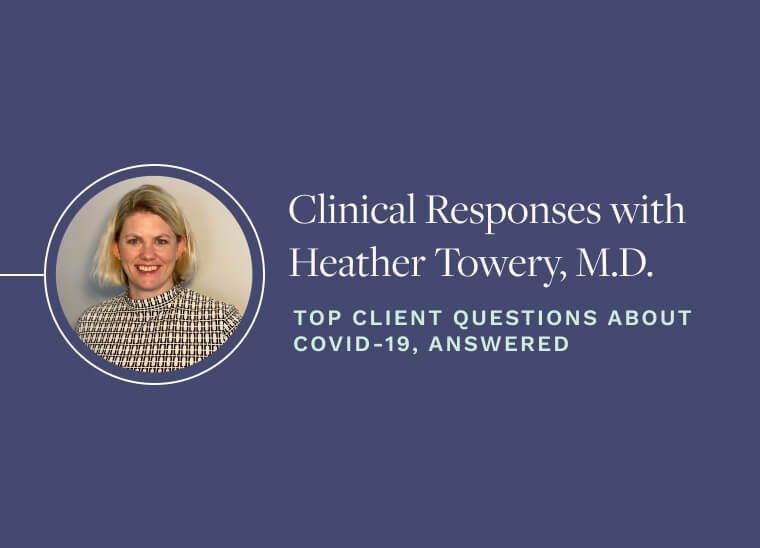Over the last 18 months, we’ve learned to live and work in a new normal and we’ve learned a lot about the human spirit and resilience. Although we have made real progress in combating COVID-19, unfortunately, we continue to confront the ongoing impact of the potent Delta variant.
Eden clinicians have acted as a resource for our clients as their employees return to an in-office work environment and as all employees continue to cope with the evolving pandemic.
We’ve compiled the top four questions Eden’s clinical team has received from our clients. Use the responses, crafted by Heather Towery, M.D., Eden’s of VP Clinical Strategy and Enterprise Partnerships, to inform your own return-to-work strategies as they evolve.
- Why are we experiencing a fourth wave? Are the vaccines no longer effective?
All the vaccines — J&J, Moderna, Pfizer — are doing their job. The goal of COVID vaccinations is to prevent severe disease, hospitalizations, and deaths. The fourth wave, or the current spike in cases across the country, is largely related to the number of people who have yet to receive the vaccine. Over 98% of ICU beds filled by COVID patients are those that are not yet vaccinated.
We are awaiting a head-to-head study of J&J, Moderna, and Pfizer to know which is truly best against the variants, including the emerging Lambda variant, but we know they all prevent severe disease, hospitalizations, and death. Please encourage all of your employees and their eligible dependents to get vaccinated.
- But what about breakthrough infections? How serious are these and do I need to worry?
When you look at the millions of people across the globe who have been stricken with COVID-19, several things stand the test of time:
- Vaccinations are better than native immunity at preventing re-infection
- Vaccinations prevent severe disease
- If a vaccinated individual does acquire COVID, the symptoms are milder, shorter lasting, and do not result in hospitalizations over 99% of the time
Everyone should be doing all they can to prevent the spread of COVID-19, including handwashing, social distancing, and masking to protect those in our communities not yet eligible to receive the vaccine (such as children and immunocompromised adults, including those battling cancer).
Although there has been a lot of news coverage about breakthrough infections in vaccinated individuals, the data tells a different story. Last month, the Kaiser Family Foundation completed an analysis across multiple states looking at the percent of fully vaccinated individuals that have experienced a COVID-19 breakthrough infection and found that the analysis reinforces what the scientific community has said about the efficacy of the COVID-19 vaccines. There have been nearly no deaths or hospitalizations, and very few diagnoses of COVID-19 among individuals who are fully vaccinated.
- Will there be more variants?
Probably, but you shouldn’t panic. How the virus evolves depends on a number of factors, including human behavior. The more people are vaccinated, the harder it is for the virus to find a new home, and we have enough vaccines in the United States for those who want one. Also, the same methods that worked before the vaccine still work: frequent handwashing with soap for 20 seconds, wearing a mask indoors and in crowded environments, and keeping extra space between yourself and others. If the virus does mutate, we will know sooner rather than later. Scientists routinely sequence the virus to determine if there have been any changes. If necessary, the pharmaceutical companies can use the sequencing information to update the vaccines. Several of these are in flight currently. All of the evidence we have shows that the current vaccines continue to show efficacy against known COVID-19 variants.
- What do I need to know about booster shots?
The government has recommended that Americans get a COVID vaccine booster shot six to eight months after their second Pfizer or Moderna shot or after their J&J single-dose shot.
Some important points:
- While we are using the term “boosters” it is important to note that there have been no changes to the makeup of any of the manufacturer’s vaccines. Your booster shot is exactly the same as it was when you received your initial dose. Over time, antibodies naturally decrease, and a booster shot reminds an individual’s immune system to make more antibodies. This is the same strategy that applies to other vaccines, like the tetanus shot. Individuals get a tetanus booster every 10 years, which is the same as the original vaccine. It does not mean that the vaccines have stopped working.
- Currently, the official recommendation is not to mix vaccine manufacturers. If you received Pfizer, you should get a Pfizer booster. The same goes for Moderna and J&J.
- If you are immunocompromised, on immunosuppressive medications, or medically high-risk (e.g. with hypertension, diabetes, obesity), you should get your booster shot now as long as it has been one month since your last dose.
- If you are not immunocompromised you should wait six to eight months from your last COVID dose.
- If you received monoclonal antibody therapy, you will need to wait at least 90 days post-treatment for another vaccination.
Eden Health is here to keep you up-to-date and answer your questions about the evolving pandemic. To learn more about our COVID-19 solutions, contact us today.
Authored by Heather Towery, M.D., VP Clinical Strategy and Enterprise Partnerships at Eden Health
Disclaimer: This information is based on current resources available and is subject to change. This document and its contents are provided for informational purposes only, and not intended to be, and should not be understood or treated as, a substitute for professional medical advice around COVID-19, its risks or symptoms, or to take the place of any local, state and national laws and guidelines around COVID-19. Always seek the advice of a physician or other qualified health provider with any questions you may have regarding a medical condition.





